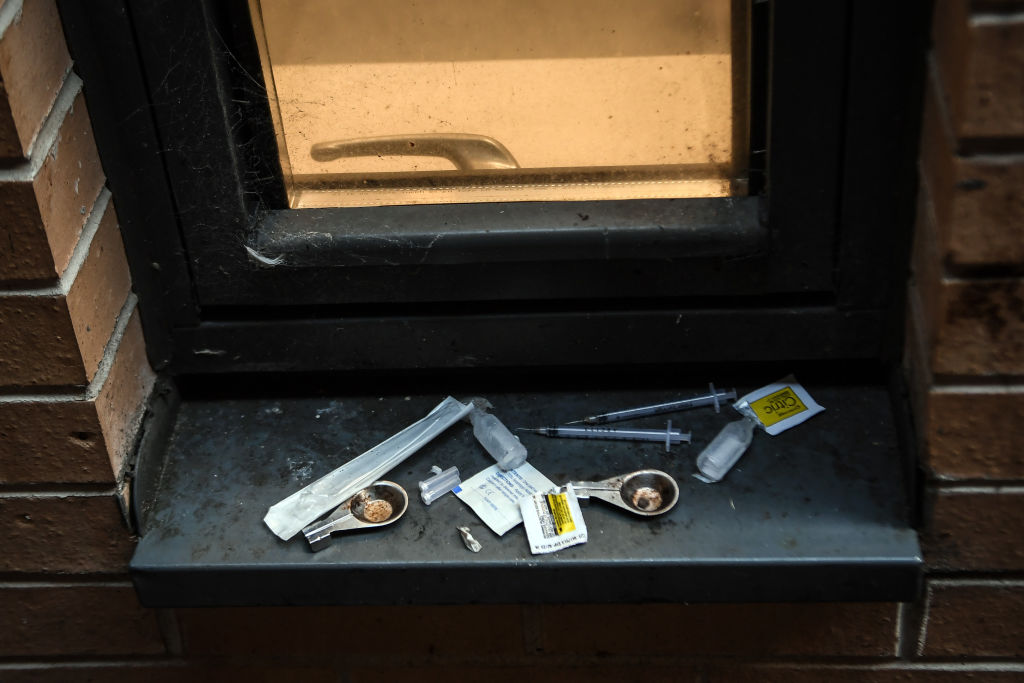You have seen the chart and it is grim. A list of European countries ranked by annual drugs deaths, with Scotland at the top and a long red bar beside it. Scotland recorded 1,264 deaths from drug misuse in 2019, more than twice the number of HIV-related deaths in Somalia and more than double the death toll from terrorism in Iraq in the same year. Two-thirds of deaths were among Scots aged 35 to 54 but there was also an increase among the 15-to-24 demographic. More than 90 per cent involved multiple-drug cocktails, with ‘Street Valium’ cited in two-thirds of cases. The fake benzodiazepines can be bought for 50p a pop on the streets of Glasgow and Dundee.
Easy answers are the bane of the drugs debate and opposition politicians have demanded the head of Joe FitzPatrick, the SNP public health minister. His coat was already on a shoogily peg following a widely derided parliamentary performance on the Covid vaccine. As the BBC’s Philip Sim notes, Nicola Sturgeon’s expressions of confidence in FitzPatrick have been barely expressed and not all that confident.
The minister has not distinguished himself but he has made some progress when it comes to drug deaths. He introduced the £20m-a-year alcohol and drug treatment strategy, established the Drugs Death Taskforce and increased distribution of Naloxone during the pandemic. It’s a modest record but, with the exception of Scottish Labour’s health spokeswoman Monica Lennon, those meant to hold him to account aren’t all that impressive either. His statement on Tuesday was delivered to a sparse attendance of MSPs. At the very least, a national scandal merits planting your backside on a seat for 20 minutes.
Whether FitzPatrick stays or goes is of less importance than the coherence of the Scottish Government’s drugs strategy. It seems evident that prohibitionism has failed but legalisation (which I support) isn’t a universal solution. More than half of drug deaths implicate heroin or morphine yet research suggests making the former generally available would not reduce mortality rates. There is, however, literature indicating that safe injection facilities cut the prevalence of fatal overdoses. The Scottish parliament has passed a non-binding motion in favour of trialling such facilities but the regulation of drugs is reserved to the UK Parliament. An unofficial facility operates out of a Ford Transit in Glasgow but its owner was recently cautioned by Police Scotland.
The Scottish Government is ever-eager to push the limits of devolution and loves instigating phoney fights with Westminster when it is politically advantageous. On safe injection sites, however, it is content to stand back and let volunteers do the heavy lifting. Saving the lives of ‘junkies’ isn’t a prime concern in focus groups and ministers are not prepared to expend political capital on an unpopular cause. Government-by-Ipsos-Mori is a coward’s game but it wins elections.
The flip side of this is the UK Government’s hidebound unwillingness to accommodate a policy differentiation that reflects Scotland’s distinctive needs. By failing to permit safe injection sites north of the border, Whitehall is making the case for powers over drugs to reside at Holyrood. When Boris Johnson says the necessary powers ‘are already vested with the devolved administration’ and that the ‘failures’ over drugs deaths ‘are very largely down to them’, he casually jettisons his share of responsibility. Contrary to the constitutional theory that has insinuated itself into Tory thinking, the UK Government is the government of the entire UK. It is not the government of England with some extraterritorial duties in Scotland, Wales and Northern Ireland around which it must tip-toe sensitively from time to time and only when absolutely necessary. Whitehall should govern Glasgow as confidently as it does Gloucester, and Glasgow needs a government that understands the scale and singularity of its drugs problem.
This is not to let the Scottish Government off the hook. While Joe FitzPatrick’s tenure has seen investment in preventing drugs deaths, it is simply a restoration of funding the SNP itself cut. The Nationalists pose as progressives in London TV studios but it’s hard to imagine a progressive Westminster government making real-term reductions of more than 53 per cent to alcohol and drug services over 12 years. The result — a 160 per cent rise in drug deaths over the same period — represents an intolerable measure of human despair, and yet it was and continues to be tolerated. Nicola Sturgeon typically pins the blame on ‘the legacy of social policies going back to the 1980s’, but is less willing to acknowledge her own, more recent contribution.
Scotland’s drugs strategy needs more money but that money also needs to be better targeted. Recovery organisations including Phoenix Futures and Jericho House have asked for an additional £20m for beds in rehabilitation facilities, a call backed by the Scottish Conservatives. Residential rehabilitation improves addiction outcomes provided it incorporates mental health treatment and continues to support patients after they have been discharged. The Scottish Drugs Forum (SDF) encourages across-the-board decriminalisation and extending police discretion to issue recorded warnings instead of making arrests, a power that currently exists in relation to cannabis but not other substances. We might add to this the urgent need to reduce the number of prison sentences issued in Scotland, which has the highest per capita prison population in western Europe. Although the figures are down from one-third two years ago, a quarter of those leaving custody are still testing positive for illegal drugs.
David Liddell, chief executive of the SDF, advocates an end to ‘the alienation, marginalisation and stigmatisation of people with a drug problem’, ‘a culture and mindset’ that is as much a cause of Scotland’s drugs quagmire as a symptom of it. There are no easy answers to a social phenomenon born of interlocking miseries but we must recognise the moral dimension of this crisis. Confronted by mass death, we are governed by indifference, paralysed by politics and addicted to breezy judgementalism. We should feel more shame than we do.







Comments